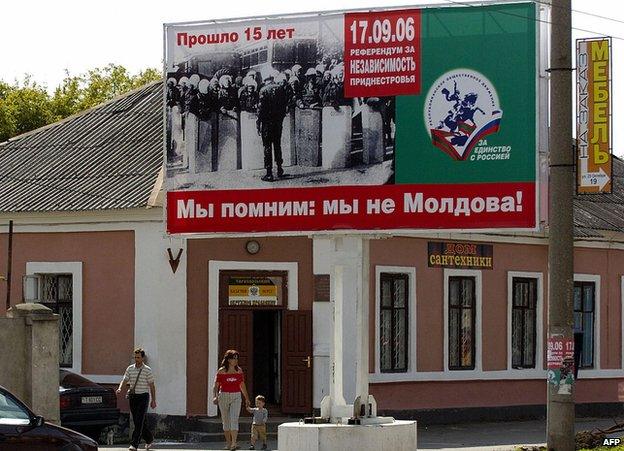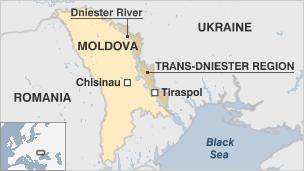Moldova's Trans-Dniester region pleads to join Russia
- Published

A sign in Trans-Dniester reminds people: "We are not Moldova!"
Pro-Russian politicians and activists in Moldova's breakaway Trans-Dniester region have asked the Russian parliament to draft a law that would allow their territory to join Russia.
The Trans-Dniestrian appeal comes as Moscow moves towards absorbing Crimea into the Russian Federation. Ukraine, the EU and US say that move is illegal.
Russian loyalists dominate Trans-Dniester, with support from Moscow.
The region split from Moldova in a war in 1991-92, as the USSR was collapsing.
Moldova's President Nicolae Timofti said in a news briefing on Tuesday that any decision by Moscow to accept Trans-Dniester "would be a step in the wrong direction".

In a September 2006 referendum, unrecognised by Moldova and the international community, the region reasserted its demand for independence.
Irina Kubanskikh, spokeswoman for the Trans-Dniester parliament, told Itar-Tass news agency that the region's public bodies had "appealed to the Russian Federation leadership to examine the possibility of extending to Trans-Dniester the legislation, currently under discussion in the State Duma, on granting Russian citizenship and admitting new subjects into Russia".
A pro-Kremlin party, A Just Russia, has drafted legislation to make it easier for new territories to join Russia. The party told the Vedomosti newspaper that the text was now being revised, in order not to delay the rapid accession of Crimea to Russia.
The Duma - Russia's lower house - and the Federation Council (upper house) are dominated by supporters of President Vladimir Putin.
Vedomosti reports that the Trans-Dniester appeal to Russia also warns about a possible further deterioration if Moldova signs an association agreement with the EU.
Moldova's leaders plan to do so. The crisis in neighbouring Ukraine erupted after former President Viktor Yanukovych was expected - and then refused - to sign such an agreement.
- Published25 October 2024
